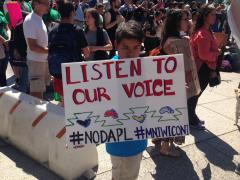By Nicole Acevedo
It may take decades to constitutionally legalize abortion in the United States again, but advocates point to opportunities that could speed up such efforts.
Human rights attorney Paula Avila-Guillen never thought she'd be fighting to decriminalize abortions in the U.S. until now, as nearly two dozen states move to ban the procedure following Roe v. Wade's official repeal Friday.
A leader of Latin America's "green wave" movement for reproductive rights, earlier this year Avila-Guillen helped legalize abortions for women up to 24 weeks-pregnant in her native Colombia, which now joins Argentina and parts of Mexico in the short list of places in Latin America where terminating a pregnancy is no longer a crime.
But it took time and arduous work: at least 15 years of civil and legal advocacy and mobilization.
“It’s a marathon, not a sprint,” said Avila-Guillen, executive director of the New York-based Women’s Equality Center. “We need to be here for the long fight."
In the U.S., she said, focusing on advances on how abortion is provided — including the ability to receive abortion pills by mail — as well as pushing for congressional legislation to codify abortion rights could help restore sooner some of the rights lost.
International legal and human rights organizations have been helping women for decades in El Salvador, which has a total abortion ban. Women who suffer miscarriages and stillbirths have been wrongfully sentenced to years in prison.
“Imagine, in that profound moment of trauma — women are being criminalized and sent to jail. That’s what’s happening to lots of women in El Salvador,” said Yanira Arias, a Salvadoran American who is a national campaign manager at Alianza Americas, a group that works with migrant communities in the U.S. and Latin America.
Over the past two decades, El Salvador has prosecuted at least 180 women who experienced obstetric emergencies, according to the Citizen Group for the Decriminalization of Abortion, which has been working to free those women since 2009.
Sixty-five imprisoned women have been released with the help of the organization as well as international groups and legal advocates like Avila-Guillen, who said that criminalizing abortions disproportionately impacts low-income women of color, LGBTQ people and immigrants — particularly those who are undocumented.
Arias, who is currently based in Puerto Rico, is fighting efforts by local lawmakers in the U.S. territory to restrict abortions as she points to what has taken place in her native country.
'We have to think 30, 40 years out'
The Supreme Court removed the constitutional right to an abortion in a 5-4 vote — a move that essentially represents the culmination of a decadeslong push by conservatives, religious activists and advocates who oppose abortion.
“Change doesn’t happen in a day, in a year, or in one election cycle. We got here over decades of carving away access to birth control, sex education, abortion access,” said Kierra Johnson, deputy executive director of the National LGBTQ Task Force, which has been advocating for abortion rights. “We have to think 30 or 40 years out. That’s going to require us to be active locally, federally, and across issues.”

